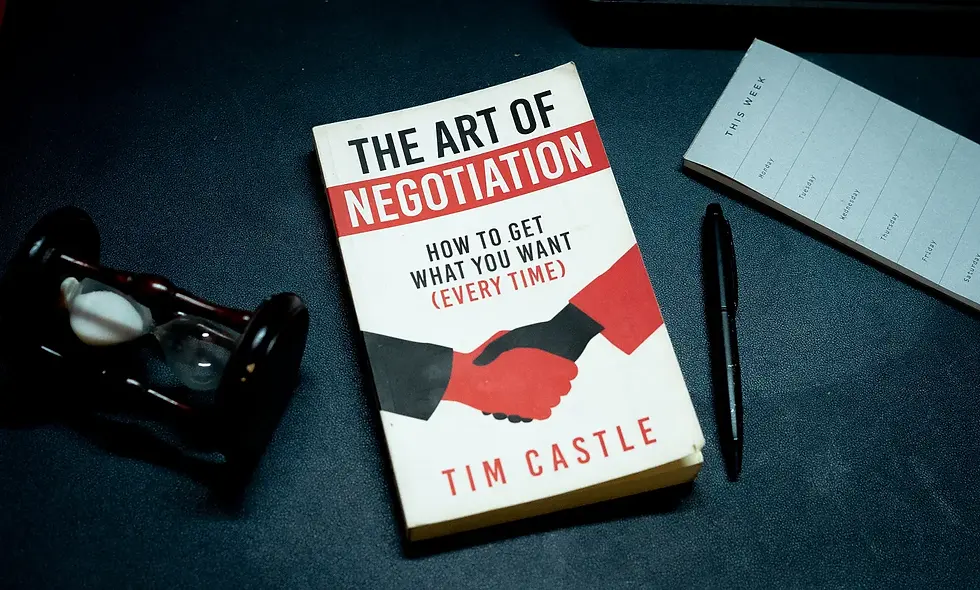8 Insider Secrets to Enhance Your Negotiation Effectiveness
- Mar 3, 2024
- 3 min read
Updated: Mar 29, 2024
Negotiation isn’t reserved for boardrooms and high-stakes business deals. It’s a skill that permeates every facet of life, from haggling at the local market to navigating personal relationships. The ability to negotiate effectively is a powerful tool that can open doors, save money, and build stronger connections. The good news? Anyone can learn to become a good negotiator. Let’s uncover eight insider secrets that will not only enhance your negotiation skills but also empower you to get what you want in every negotiation scenario.

1. Master the Art of Active Listening: Effective negotiation begins with the ability to listen actively. Many negotiations falter because participants are too focused on presenting their arguments without truly understanding the other party’s perspective. By honing your active listening skills, you gain valuable insights into the needs, concerns, and motivations of the other party. This knowledge becomes a powerful tool in crafting proposals that address their interests, paving the way for a more collaborative and successful negotiation.
2. Build Genuine Rapport: Building rapport is more than just a social nicety; it’s a strategic move in negotiation. People are more likely to agree to terms when they feel a genuine connection with the person on the other side of the table. Take the time to establish common ground, find shared interests, and show genuine interest in the other party’s perspective. Building a positive rapport creates a conducive atmosphere for open communication and fosters a sense of trust that can significantly impact the negotiation outcome.
3. Strategic Silence Speaks Volumes: In negotiations, silence can be a powerful ally. Embrace strategic pauses after making a proposal or counteroffer. This silence puts pressure on the other party to respond and can lead to concessions or additional information. It’s a subtle but effective tactic that allows you to gauge the other party’s commitment to their position and creates room for them to reconsider their stance.
4. Research and Information Are Your Weapons: Knowledge is power in negotiation. Before entering any negotiation, invest time in thorough research. Understand the market value of the product or service in question, gather information about the other party’s needs and priorities, and be well-versed in industry trends. Armed with this information, you position yourself as an informed and confident negotiator, giving you an edge in steering the negotiation in your favour.

5. Negotiate with a Win-Win Mindset: A common misconception is that negotiation is a zero-sum game where one party’s gain is another’s loss. However, adopting a win-win mindset can lead to more sustainable and mutually beneficial agreements. Seek solutions that meet the needs of both parties, fostering a collaborative environment that sets the stage for future positive interactions. A win-win approach not only enhances your reputation but also strengthens relationships for future negotiations.
6. Timing Is Everything: The timing of your proposals and responses can significantly impact the negotiation’s outcome. Be mindful of the context and the other party’s emotional state. For instance, presenting a counteroffer immediately after a concession might not be as effective as waiting for a strategic moment when the other party is more receptive. Patience and strategic timing can be powerful tools in negotiation.
7. Embrace Flexibility in Your Approach: Rigidity seldom serves well in negotiations. Flexibility allows you to adapt to changing circumstances, explore alternative solutions, and find common ground with the other party. Being open to compromise without compromising your core objectives demonstrates a willingness to work collaboratively, fostering an environment where both parties feel heard and respected.
8. Convey Confidence and Assertiveness: Confidence is contagious, and assertiveness is key in negotiation. Stand firm on your objectives, articulate your points clearly, and exude confidence in your proposals. However, balance is crucial; assertiveness should not be mistaken for aggression. A confident yet respectful approach contributes to a positive negotiation dynamic, increasing the likelihood of achieving your desired outcomes.

Ready to elevate your negotiation game? If you’re eager for more in-depth insights, practical tips, and strategies that will transform your negotiation skills, consider delving into my book, “The Art of Negotiation: How to Get What You Want (Every Time).” In this comprehensive guide, I share my personal experiences, insider secrets, and a step-by-step approach to mastering the art of negotiation. Don’t miss the chance to unlock the doors to enhanced negotiation effectiveness.
Grab your copy now and take the first step toward becoming a master negotiator.
Negotiation is an indispensable skill that anyone can learn and refine. By incorporating these eight insider secrets into your approach, you can enhance your negotiation effectiveness and navigate a wide range of scenarios with confidence. From active listening and building rapport to strategic silence and a win-win mindset, these strategies provide a roadmap for success in negotiations, whether in business or personal interactions. Remember, the key lies in continuous learning and practice, so embrace these secrets and watch your negotiation prowess soar.







Comments